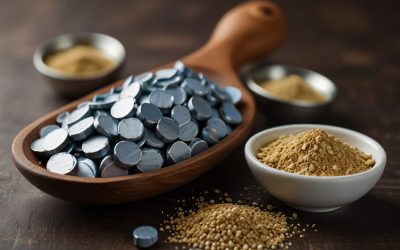Nearly 60% of Americans suffer from some form of chronic inflammatory condition, signaling a growing interest in your potential alternatives to traditional pharmaceutical interventions. You’re not alone in seeking out natural ways to soothe your body’s inflammation – a response that, when chronic, can be linked to a myriad of health issues. From dietary adjustments brimming with antioxidants to the ancient wisdom of herbal supplements, you have a rich tapestry of options to explore. You’ll find that incorporating certain lifestyle changes, such as regular exercise and stress management, can make a significant impact on your wellbeing. As you navigate through the myriad of natural remedies available, you’ll discover which methods resonate with your unique body and lifestyle, potentially unlocking a more holistic path to managing your inflammation.
Key Takeaways
- Incorporating antioxidants and phytonutrients into your diet can help reduce the risk of chronic inflammation.
- Turmeric and ginger have anti-inflammatory effects and can be integrated into daily meals for natural relief.
- Regular exercise, such as brisk walking and swimming, can reduce inflammation and lower the risk of chronic health conditions.
- Adopting an anti-inflammatory diet, managing stress, and getting quality sleep are important lifestyle changes for inflammation relief.
Understanding Inflammation
Inflammation is your body’s innate defense mechanism against injury or infection, playing a pivotal role in healing and immune response. While it’s a natural response, the inflammatory process can sometimes persist longer than necessary. This ongoing state, known as chronic inflammation, can be influenced by stress, dietary choices, and other lifestyle factors. Chronic inflammation is linked to numerous health conditions, underscoring the importance of understanding how to manage it effectively.
You can take proactive steps to reduce chronic inflammation through various lifestyle modifications. Regular exercise and stress management techniques like meditation are proven methods that bolster your immune system and mitigate the release of pro-inflammatory cytokines. These cytokines are signaling molecules that can exacerbate inflammatory responses when produced in excess.
Incorporating specific foods into your diet is another potent approach. Those rich in omega-3 fatty acids, such as flaxseeds, walnuts, and fatty fish, are renowned for their anti-inflammatory properties. Omega-3s help counterbalance the effects of omega-6 fatty acids, which, in high amounts, can contribute to inflammation.
Additionally, natural remedies have garnered attention for their ability to support the body’s inflammatory response. Herbs like turmeric, which contains curcumin, and ginger, are celebrated for their anti-inflammatory effects. Both herbs have been utilized in traditional medicine systems and are now backed by scientific research indicating their potential to alleviate acute inflammation and support overall health.
Dietary Anti-Inflammatory Foods

A plethora of natural foods, rich in antioxidants and phytonutrients, can significantly diminish the risk of chronic inflammation when incorporated into your daily diet. This approach, focused on health and natural solutions, isn’t just about reducing symptoms but is a proactive measure in nurturing your body’s well-being.
To combat inflammatory responses, it’s crucial to understand that diets high in saturated fat and refined sugar are often culprits of increased inflammation. Instead, prioritize foods that are known to reduce inflammation. These include a variety of fruits and vegetables, which are packed with essential vitamins and anti-inflammatory properties. Adding nuts and seeds to your diet provides fiber and healthy fats, while herbs and spices, such as turmeric and ginger, offer potent anti-inflammatory benefits.
Moreover, omega-3 fatty acids play a pivotal role in managing inflammation. Foods rich in omega-3s, like fatty fish, are integral to a diet aimed at inflammation relief. The Mediterranean diet, which emphasizes the consumption of these healthy fats, along with whole grains and lean protein, may help reduce the risk of chronic diseases associated with inflammation.
Maintaining a moderate weight through balanced diet choices is also key to keeping inflammation at bay. Regular exercise complements a healthy diet and contributes to weight management, further aiding in the reduction of inflammation. It also benefits mental health, which is an important component of holistic well-being.
As you serve others by sharing this knowledge, remember that a journey to health is a collective endeavor, where each natural, dietary choice can lead to a significant positive impact on inflammation and overall health.
Herbal Remedies and Supplements
Have you considered the potent anti-inflammatory effects of herbal remedies and supplements, such as turmeric and ginger, in your quest for natural health solutions? These natural supplements to help reduce inflammation are grounded in traditional uses and are increasingly supported by modern research.
Turmeric contains a compound called curcumin, which has been extensively studied for its ability to inhibit inflammatory chemicals like cytokines. This makes turmeric a cornerstone of any anti-inflammatory diet. Its effectiveness is so notable that some studies suggest curcumin supplementation can be as beneficial as certain over-the-counter drugs for managing inflammation.
Similarly, ginger, another spice renowned for its health benefits, is more than just a flavor enhancer. It’s been found to help fight inflammation at a cellular level, perhaps even more effectively than nonsteroidal anti-inflammatory drugs (NSAIDs). By integrating these spices into your daily meals, you’re not only enriching the flavor of your foods but also contributing to a natural, anti-inflammatory lifestyle.
However, while foods are good sources of these potent anti-inflammatory compounds, supplements may help achieve more concentrated doses. It’s crucial to remember that self-prescribing isn’t the safest approach. Always consult with a physician to ensure that any herbal remedies or supplements you consider are appropriate for your individual health needs, especially if you’re taking other medications.
The holistic approach to health care emphasizes the importance of natural interventions in managing and preventing disease. By incorporating these herbal remedies and supplements into your care routine, you’re taking a proactive step toward holistic well-being, potentially reducing the need for pharmaceutical interventions and their associated side effects.
The Role of Exercise

Turning to the power of physical activity, regular exercise plays a crucial role in mitigating inflammation and fostering overall health. When you engage in consistent physical activity, you’re not only strengthening your muscles and improving your cardiovascular health, but you’re also engaging in a natural anti-inflammatory process. Regular exercise can help reduce inflammation by promoting a balance within your immune system and reduce the risk of chronic health conditions linked to high inflammation levels.
Incorporating regular exercise into your routine doesn’t mean you need to run marathons or lift heavy weights. Here’s how you can integrate activity in a balanced and enjoyable way:
- Aerobic exercises: Such as brisk walking, swimming, or cycling, can help lower levels of inflammation and are gentle on the joints for those managing arthritis symptoms.
- Strength training: Engaging in moderate resistance training can build muscle mass, which is beneficial in managing weight and reducing inflammation.
- Flexibility and balance exercises: Practices like yoga and Pilates not only help reduce inflammation but also improve mental health and stress management.
It’s clear that regular exercise acts as a natural anti-inflammatory, providing an alternative to relying solely on anti-inflammatory drugs. You’ll find that by encouraging others to embrace physical activity, you’re supporting their journey to not only help reduce inflammation but also to enhance their overall well-being. Remember, even small increases in physical activity can have significant health benefits. It’s important to start slowly and build up gradually, especially if dealing with chronic health conditions or increased inflammation. Always consult with a healthcare professional before starting any new exercise regimen.
Stress Management Techniques
While incorporating exercise into your routine is integral for reducing inflammation, it’s equally important to address the stress in your life, which can significantly exacerbate inflammatory responses. Stress, by activating your immune system and inflammatory pathways, can cause a chronic state of inflammation, undermining your health and wellness efforts. Here are some evidence-based techniques to help manage stress and support your journey towards reducing inflammation.
First, deep breathing exercises are a powerful tool. They can lower levels of the stress hormone cortisol, thereby mitigating oxidative stress and inflammation. Allocate a few minutes each day to practice, perhaps incorporating this into a morning or evening ritual.
Meditation is another cornerstone of stress management. It can help reduce the mental and physical manifestations of stress, thereby reducing inflammation. Regular meditation encourages a state of relaxation and has been shown to have a positive effect on the immune system.
Engaging in yoga not only provides the physical benefits of exercise but also promotes relaxation and mindfulness, which can help manage stress triggers. Additionally, ensuring adequate and regular sleep is crucial as it helps reset stress response systems and supports the body’s ability to manage inflammation.
Below is a table summarizing these stress management techniques:
| Technique | Benefit | How It Helps Reduce Inflammation |
|---|---|---|
| Deep Breathing | Lowers cortisol levels | Reduces oxidative stress |
| Meditation | Encourages relaxation | Positively affects the immune system |
| Yoga | Promotes relaxation and mindfulness | Helps manage stress triggers |
| Regular Sleep | Resets stress response systems | Supports body’s inflammation management |
Incorporate these techniques into your daily routine to not only serve your own body but to enhance your ability to serve others with a more balanced and healthful approach to life.
Importance of Quality Sleep

Understanding the role of quality sleep is imperative for managing inflammation and enhancing your body’s natural restoration processes. When you’re aiming to alleviate inflammatory conditions such as arthritis or other chronic health issues, getting consistent, restorative sleep isn’t just beneficial—it’s essential.
Quality sleep has a direct impact on your body’s inflammatory response. Here are several reasons why:
- Consistent Sleep Patterns: Aligning with your natural circadian rhythms by establishing a regular sleep schedule can reduce long-term inflammation.
- Hormonal Balance: Sleep supports hormone health, which in turn can help regulate inflammation levels throughout your body.
- Cellular Repair: During deep sleep, your body undergoes repair and regeneration, which is crucial for managing inflammation and overall well-being.
If you’re struggling with better sleep, it’s important to consult a healthcare professional to address potential underlying conditions. Moreover, simple lifestyle adjustments like winding down before bed and creating a sleep-conducive environment can be powerful steps toward achieving quality sleep.
Remember, while natural remedies for inflammation relief are valuable, they should be part of a holistic approach that includes proper sleep hygiene. As someone who desires to serve others, it’s key to understand and communicate the importance of quality sleep—not only for its immediate benefits but also for its role in combating chronic health challenges.
In today’s fast-paced world, it’s easy to overlook sleep’s vital function. However, prioritizing quality sleep can be a transformative step in managing inflammation and maintaining long-term health. So, encourage those you serve to invest in their sleep as diligently as they would any other aspect of their health regimen.
Topical Natural Treatments
When seeking to soothe inflammation through topical treatments, natural remedies such as aloe vera gel and witch hazel can offer significant relief without the side effects often associated with synthetic medications. These botanicals are not only gentle on your skin but also support your body’s natural healing processes.
Your skin is your first line of defense, and taking care of it with the right ingredients can help increase the chances of maintaining its health. Omega-3 fatty acids, for example, found in fish oil, are known for their anti-inflammatory properties. Applying fish oil topically can help relieve the discomfort from inflammation and is particularly beneficial for conditions exacerbated by a risk factor like poor dietary choices. Fish such as salmon are excellent sources of these fatty acids, but topical application ensures direct benefits to affected areas.
Inflammation can lead to a cascade of inflammatory molecules causing pain and irritation. Herbal ointments with ingredients like German chamomile or turmeric are potent in quelling these inflammatory responses. Here’s a table summarizing some effective topical treatments:
| Natural Ingredient | Benefit |
|---|---|
| Aloe Vera Gel | Moisturizes and soothes |
| Witch Hazel | Reduces swelling and irritation |
| Fish Oil | Alleviates pain and inflammation |
| Turmeric | Contains curcumin, which reduces inflammatory molecules |
Lifestyle Changes for Long-Term Relief
To achieve long-term relief from inflammation, incorporating certain lifestyle changes can be just as critical as using topical remedies. It’s essential to understand that how you live day-to-day can significantly impact inflammatory conditions such as arthritis, inflammatory bowel disease, and the overall function of your immune system.
Here are some lifestyle adjustments that can make a meaningful difference:
- Optimize Your Diet: A diet high in fruits, vegetables, nuts, seeds, and healthy fats, particularly those from fish, can reduce inflammation. Supplements such as omega-3 fatty acids and vitamin D may help increase the anti-inflammatory effects while supporting your immune system.
- Incorporate Regular Exercise: Exercise not only helps maintain a healthy weight, which is crucial for reducing stress on joints in conditions like rheumatoid arthritis, but also contributes to mental well-being, which can in turn lower stress-induced inflammation.
- Manage Stress and Sleep: Recognize and manage stress triggers to prevent exacerbations of certain inflammatory conditions. Also, establishing a consistent sleep schedule helps regulate the body’s natural inflammatory responses.
Adopting these changes may require guidance and support, which can be found in healthcare professionals, community groups, and educational resources. Your diet may help increase your body’s resilience against inflammation, bolstering your immune response and mitigating the effects of chronic inflammatory conditions. By nurturing your body with nutritious foods, maintaining physical activity, and ensuring restorative sleep, you’re equipping yourself to serve others more effectively and with greater compassion. Remember, the pursuit of health is not just about alleviating symptoms but nurturing a life of vitality and service.











